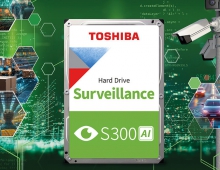
Toshiba, SanDisk develop 8-Gbit, 70nm NAND flash
Toshiba and SanDisk unveiled an 8Gbit NAND flash memory chip fabricated with 70nm process technology with 1Gbyte data storage capacity at the International Solid-State Circuits Conference in San Francisco.
The new NAND flash employs multi-level cell (MLC) technology to allow two bits of data to be stored in one memory cell, thereby doubling memory capacity.
Further, the companies said certain circuit design techniques were utilized to improve chip area resulting in an 8Gbit chip size that is less than 5 percent larger than the previous generation 4Gbit chip on 90nm process technology.
At 146 square millimeters, the 8Gbit chip has a density of 6 billion bits or 3 billion transistors per square centimeter (20 billion transistors per square inch of silicon).
Performance was maximized by adoption of fast writing circuit techniques, which reduced data write times and support a fast write speed of 6-megabytes per second. Read speed of 60Mbits per second, 40 percent faster than the previous generation, was achieved by a combination of burst mode and high read bandwidth.
Toshiba and SanDisk plan to start production of flash memory products based on the 8Gbit NAND flash memory technology this summer.
By next year, this chip is expected to become the production workhorse for the venture between the companies, bringing significant cost reductions to the flash storage products of both.
The companies also said they would commercialize a 16Gbit NAND flash memory IC that stacks two of the 8Gbit NAND flash memories in a single package.
Further, the companies said certain circuit design techniques were utilized to improve chip area resulting in an 8Gbit chip size that is less than 5 percent larger than the previous generation 4Gbit chip on 90nm process technology.
At 146 square millimeters, the 8Gbit chip has a density of 6 billion bits or 3 billion transistors per square centimeter (20 billion transistors per square inch of silicon).
Performance was maximized by adoption of fast writing circuit techniques, which reduced data write times and support a fast write speed of 6-megabytes per second. Read speed of 60Mbits per second, 40 percent faster than the previous generation, was achieved by a combination of burst mode and high read bandwidth.
Toshiba and SanDisk plan to start production of flash memory products based on the 8Gbit NAND flash memory technology this summer.
By next year, this chip is expected to become the production workhorse for the venture between the companies, bringing significant cost reductions to the flash storage products of both.
The companies also said they would commercialize a 16Gbit NAND flash memory IC that stacks two of the 8Gbit NAND flash memories in a single package.





















